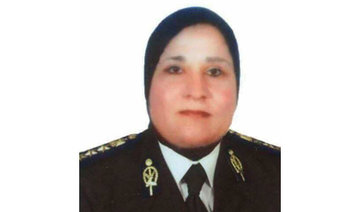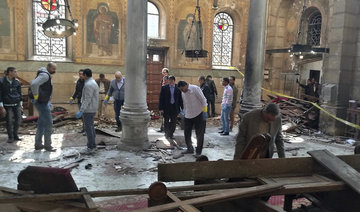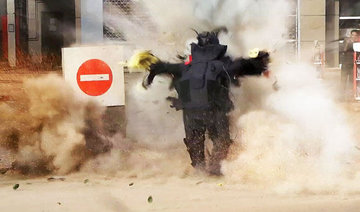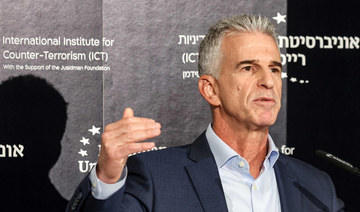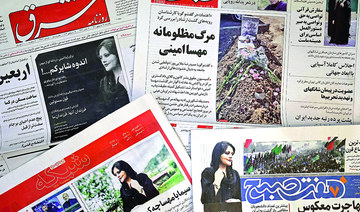CAIRO: Ten people were killed and five others were injured on Friday morning in an armed clash after security forces attempted to thwart a terrorist attack targeting a church in the southern Cairo suburb of Helwan, according to Egypt’s Health Ministry.
The Interior Ministry said in a statement that security forces shot and wounded a terrorist who was riding a motorcycle and shooting randomly in an attempt to storm the Mar Mina Church in Helwan. Security forces found an automatic gun, 150 bullets and a bomb on the wounded terrorist, according to the ministry statement.
Before the church shootout, the terrorist opened fire on nearby commercial stores, killing two citizens.
The ministry said that the terrorist’s name is Ibrahim Ismail Mustafa, and he has taken part in other terrorist attacks. A ministry official said the terrorist’s identity had some of the fingerprints of Daesh.
The Egyptian national TV said that a terrorist was killed and another was arrested, while the Interior Ministry said the attack was executed by one terrorist only.
An official source at the Saudi Foreign Ministry strongly condemned the attack. The source offered deep condolences to the families of the victims and the people and government of Egypt, wishing the wounded a speedy recovery. The source renewed the Kingdom’s support of Egypt against such attacks.
Denouncing the attack, King Abdullah of Jordan stressed Amman’s solidarity with Cairo and its support against terrorism. He also expressed his deepest condolences to President Abdel Fattah El-Sisi and the families of the victims.
Yousef Al-Othaimeen, secretary-general of the Organization of Islamic Cooperation (OIC), highlighted the preparedness of the Egyptian security forces, noting that the supporters of the terrorist attack have been trying to execute a desperate plan targeting the security of Egypt. He renewed the position of the OIC in condemning terrorism and extremism in all its forms and manifestations.
Daesh had threatened more than once this year to target Egyptian Christians and their churches. The last threat came when Wafa Media Foundation, a propaganda body affiliated to the network of Daesh, incited the militants to kill Egypt’s Christians and bomb their churches.
Daesh claimed responsibility for three massive attacks on Egyptian churches through the past year; the first one was on St. Peter’s Church in Cairo in December 2016, and the second and third attacks were on two churches in Alexandria and Tanta in April.
El-Sisi said the terrorist attacks would make Egyptians more determined to continue cleansing the country of terrorism and extremism.
El-Sisi extended “his condolences to the families of the victims of the despicable terrorist attack.” He instructed the relevant bodies to provide the necessary care for the victims’ families, and ordered tightened security at vital sites.
Mai Mogib, who teaches political science at the University of Cairo, said that it was possible to identify two political objectives behind the escalation of terrorist attacks and threats against Egyptian Christians during the past year. “The first one is to create sectarian tension that will drain the state’s institutions, weaken security efforts and people’s trust in any security successes that might be announced in other fronts like Sinai and Western Desert,” he said.
“The second one is to erode the popularity of the president among Christians; an important support base, especially when the presidential elections will be held in June,” he said.
The attack has been expected by Egyptian security bodies since the Interior Ministry on Dec. 17 raised the security alert to the maximum level during the Christmas holidays.
Interior Minister Magdy Abdel-Ghaffar stressed the importance of intensifying security measures at Christian sites and constantly monitoring the perimeters of all churches.
Abdel-Ghaffar told the ministry’s officials that it was “necessary to continue taking pro-active measures and thwart the terrorist attacks,” warning that “the decisive security confrontations with terrorists in Sinai might push these terrorists to escape and sneak into cities.”
In June, the weekly newspaper Al-Naba, published by the media center of Daesh, claimed that the terror group had another branch in Egyptian districts, known as “the Caliphate’s Soldiers in Egypt,” along with Daesh’s more active first branch, “Sinai Province.”
Meanwhile, the Egyptian armed forces announced they would continue their joint efforts with the Interior Ministry to boost security during the holiday season. A spokesperson for the Egyptian armed forces said that the citizens’ protection units affiliated to the armed forces were working intensively alongside the police in streets and religious places.
He said that the armed forces were backed by additional specialized and technical forces ready for an immediate action in the event of any emergency on New Year’s Eve.
Ten killed as terrorists attack Coptic church in Egypt
Ten killed as terrorists attack Coptic church in Egypt

Former Mossad chief disappointed with ‘inconceivable’ allegations of intimidation of ICC prosecutor

- Tamir Pardo says alleged ‘threats and manipulation’ reminiscent of ‘Cosa Nostra-style blackmail’
- Agency accused of targeting prosecutor in years-long campaign to sway war crimes investigations
LONDON: A former head of Israeli intelligence agency Mossad has expressed his disappointment at the alleged intimidation of an International Criminal Court prosecutor by the organization, something he said was “inconceivable.”
Earlier this week, British newspaper The Guardian published an investigation into what it claimed was a years-long campaign of intimidation by Mossad director Yossi Cohen against former ICC prosecutor Fatou Bensouda between 2016 and 2021 in an attempt to sway war crimes investigations.
In 2021, Bensouda opened a formal investigation into alleged Israeli war crimes in the occupied Palestinian territories, which ended with her successor, Karim Khan, seeking an arrest warrant for Israeli Prime Minister Benjamin Netanyahu.
According to the Guardian investigation, Cohen is alleged to have used “threats and manipulation” against Bensouda to force her to cooperate with Israel’s demands.
Cohen and Bensouda have declined to comment on the investigation.
Tamir Pardo, who served as director of the Mossad between 2011 and 2016, has told the newspaper that he did not believe any Mossad employee “would do things of the type described,” adding that it was reminiscent of “Cosa Nostra-style blackmail.”
Reporters in Israel working for Haaretz and TheMarker had also tried to report on the alleged intimidation in 2022, but were blocked from doing so by senior Israeli security officials, the Guardian reported.
“It doesn’t seem true. It’s inconceivable that something like this happened. It sounds to me like they’re talking about some other country and not about Israel,” Pardo said, adding that the actions alleged in the Guardian’s investigation were “not permissible” and “forbidden” in the Mossad he served.
“There are things that spy agencies do not do, things that they won’t do, and that are forbidden for them to do, and this is one of them.
“I don’t want to think that anyone who works for the organization in which I served for 36 years, let alone a person who headed it, was involved in the event that was described in the media,” he added.
Pardo said he might be “better off” living in denial if the findings are proven to be true.
“Maybe I’m better off that way, otherwise it’s just a horrible disappointment that something like this could happen in my country. I’ve seen some strange things in my life, but I refuse to believe that the organization I served and whose values I believed in could do something like this,” he said.
“I don’t think that Israel or its emissaries should be using blackmail and threats against a prosecutor in the court in The Hague, which the Jewish people were key to establishing after the Holocaust in the Second World War. It doesn’t make sense to me.”
UK to continue arms sales to Israel after latest review

- Govt ministers advised on 3-month period of fighting in Gaza up to April 24
- Decision appears to contradict ICC issuing of arrest warrant for Israeli PM
LONDON: Government ministers in the UK have found no reason to suspend weapons exports to Israel after reviewing the latest three-month period of the Gaza war.
The review of evidence covered the three months up to April 24, following an earlier examination that reported on Israel Defense Forces activity until the end of January, The Guardian reported.
Israel’s killing of three UK aid workers attached to the World Central Kitchen took place in past periods reviewed by ministers.
The reviews are sent to Foreign Secretary David Cameron and then forwarded with advice to Business Secretary Kemi Badenoch, who signs off on the final decision.
The UK previously warned against a major Israeli invasion of Rafah in southern Gaza, describing the strategy as a potential breach of international law. However, the latest review does not cover the recent outbreak of violence in the city.
Government ministers have refused to call for an end to Israel’s southern offensive, but say the deaths of 45 Palestinians in a designated safe zone last week should be investigated by a transparent inquiry.
A statement from the UK Foreign Office said: “As required by the UK’s robust arms export control regime, the foreign secretary has now reviewed the most recent advice about the situation in Gaza and Israel’s conduct of their military campaign.
“The business secretary has therefore decided our position on export licences remains unchanged. This is consistent with the advice ministers have received. As ever, we will keep the position under review.
“The UK operates a robust and thorough assessment of arms export licence applications against the Strategic Export Licensing Criteria. These criteria include that we will not grant an export licence if there is a clear risk that the items might be used to commit or facilitate a serious violation of international humanitarian law.”
The UK decision to continue arms sales appears to contradict the recent move by International Criminal Court prosecutor Karim Khan to seek arrest warrants for Israeli Prime Minister Benjamin Netanyahu and Defense Minister Yoav Gallant.
Iran ex-Guards officer sanctioned by US launches presidential bid

- Haghanian under US sanctions since 2019 for role in supreme leader Ayatollah Ali Khamenei’s ‘inner circle’
TEHRAN: A former commander in Iran’s Revolutionary Guards who is under US sanctions registered his candidacy Saturday for next month’s presidential election, state media reported.
Like other hopefuls, Vahid Haghanian, will have to wait to see if his candidacy is okayed by the Guardian Council, a 12-strong body of jurists dominated by conservatives that vets all candidates for public office.
Little information has been made public about Haghanian’s career in the Guards, the ideological arm of Iran’s armed forces.
Like late president Ebrahim Raisi whom he is seeking to succeed, Haghanian has been under US sanctions since 2019 for his role in supreme leader Ayatollah Ali Khamenei’s “inner circle responsible for advancing the regime’s domestic and foreign oppression.”
Haghanian said his candidacy was a “personal decision” but he was “fully familiar with the issues of the country.”
He said he had forged close ties with key officials in state institutions “during 45 years of service in the presidential administration and the office of the supreme leader.”
The June 28 election was called after Raisi was killed in a May 19 helicopter crash.
Candidate registration opened on Thursday and closes on Monday.
Others who have announced their candidacies include Tehran mayor Alireza Zakani and former lawmaker Zohreh Elahian, the first woman to enter the race.
Moderate ex-parliament speaker Ali Larijani, reformist former central bank governor Abdolnasser Hemmati and ultraconservative former nuclear negotiator Saeed Jalili have also registered.
The Guardian Council will announce the final list of candidates on June 11 after it has completed its vetting procedures.
The council disqualified several reformist and moderate candidates from the last presidential election in 2021, including former speaker Larijani.
Iran arrests 35 in raid on ‘satanist gathering’: media

- The raid took place after police had “identified the location” of the gathering
- A total of “31 men and four women at the venue” were taken into custody
TEHRAN: Iranian authorities have arrested 35 people in a raid on a “satanist network gathering” in the southwestern province of Khuzestan, local media reported Saturday.
The raid took place after police had “identified the location” of the gathering, which featured “signs and symbols of satanism, alcohol and drugs,” ISNA news agency said.
Raids on so-called “satanist” gatherings are not uncommon in the deeply conservative country, often targeting parties or concerts with alcohol consumption, which is largely banned in Iran.
A total of “31 men and four women at the venue” were taken into custody and referred to judicial authorities, ISNA said quoting Ruhollah Yaarizadeh, police chief in Khuzestan’s Dezful city.
In May, police arrested more than 250 people including three Europeans west of the capital Tehran over similar charges.
A 2007 raid on an unauthorized rock concert near Tehran saw some 230 people arrested.
Authorities in the Shiite Muslim-dominated country have in the past branded rock and heavy metal music concerts as “satanist” gatherings.
Turkish drone strikes in Syria kill 4 US-backed fighters, wound 11 civilians

- There was no immediate comment from Turkiye
- The SDF said drone strikes hit its positions eight times as well as civilian homes and vehicles
QAMISHLI, Syria: Turkish drone strikes in northeastern Syria on Friday evening killed four US-backed fighters and wounded 11 civilians, the Kurdish-led force said.
The strikes on areas held by the US-backed and Kurdish-led Syrian Democratic Forces came a day after Turkiye’s president said his government won’t hesitate to act against Kurdish-led groups in northern Syria if they proceed with plans to hold local elections. It accuses the groups of having links to outlawed Kurdish militants in Turkiye.
The SDF said drone strikes hit its positions eight times as well as civilian homes and vehicles in and near the northern city of Qamishli. Such Turkish strikes are not uncommon in northeastern Syria.
The Kurdish Red Crescent said that as its paramedics were trying to reach the attacked areas, a Turkish strike hit one of its ambulances, putting it out of service. It said the attack occurred near the town of Amouda, west of Qamishli.
There was no immediate comment from Turkiye.
The Kurdish-led autonomous administration that controls northern and eastern parts of Syria has announced plans to hold municipal elections June 11. The vote to choose mayors will be held in the provinces of Hassakeh, Raqqa, Deir Ezzor and the eastern part of Aleppo province.
On Friday, State Department spokesperson Vedant Patel posted on X that “we don’t think that the conditions for such elections are in place in NE Syria in present time.”
The comments appeared to be a message to Kurdish-led authorities not to hold the elections.
Turkiye, which has conducted military operations in Syria in the past, considers the move a step by Syrian Kurdish militants toward the creation of an independent Kurdish entity across its border. It has described the planned polls as a threat to the territorial integrity of both Syria and Turkiye.
“We are closely following the aggressive actions by the terrorist organization against the territorial integrity of our country and of Syria under the pretext of an election,” President Recep Tayyip Erdogan said Thursday.
Turkiye considers the Kurdish militia group, known as the People’s Protection Units, as a terrorist group linked to an outlawed Kurdish group that has led an insurgency in Turkiye since 1984. That conflict with the Kurdistan Workers’ Party has killed tens of thousands of people.
The People’s Protection Units provide the backbone of the Syrian Democratic Forces, which is a key US ally in the fight against the Daesh group. American support for the SDF has infuriated Turkiye and remains a major source of friction in their relations.


